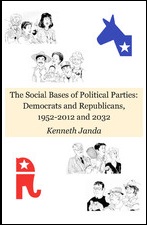The Social Bases of Political Parties
Par : Kenneth Janda
Release date: Jan 2013
Kenneth Janda Publisher
Nombre de pages: 110
ISBN: 9780988888104


Based on 16 national surveys from 1952 to 2012, this book (1) describes—in colored charts—how the United States society has changed from 1952 to 2012 in terms of occupation, education, regional growth, urbanization, religion, ethnicity, and ideology; (2) summarizes how the patterns of social support for the Democratic and Republican parties have shifted with these changes; (3) indicates how the parties have articulated the political interests of their social bases in congressional voting in Congress; and (4) invites readers to speculate about the future of our two-party system in 2032 by offering their views in a national survey.
The analysis relies mainly on sixteen national surveys that asked people about their political party identification, which means their party preferences, not how they voted. Fifteen surveys were conducted by the American National Election Studies during presidential years from 1952 to 2008. The sixteenth survey was by the Pew Research Center in January, 2012. Data on voting in the House of Representatives came from various Washington interest groups that monitor congressional voting.
Although a great deal of data underlies the analysis, the book contains only two data tables, both in Chapter 1. All subsequent data are reported in colored charts that graph the major patterns and trends. There is no formal statistical analysis, but two formulas are defined in Chapter 1 to measure the extent of attraction of party support across social groups and the extent of concentration of group support within a party.
The book also aims to inform students about political history and to acquaint them with epistemology—the study of how we know what we think we know. The introductions to Chapters 2 through 8 delve briefly into the background of the contemporary bases of party support (e.g., religion in the American colonies). The sections on change in American society over sixty years from 1952 to 2012 explain how pollsters have asked about—and learned about—religion, ethnicity, and other topics.











